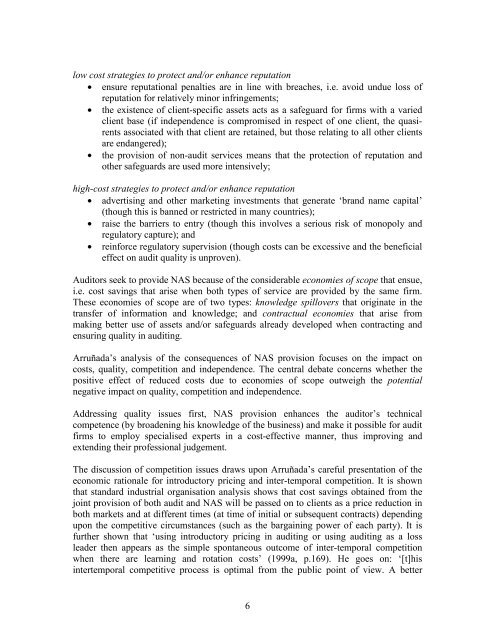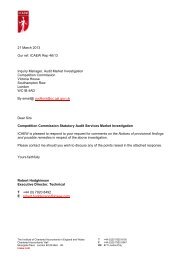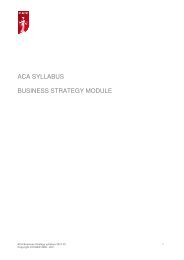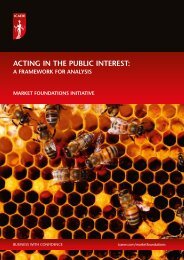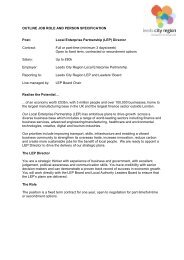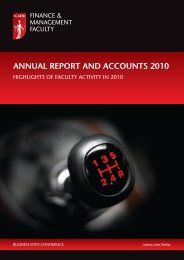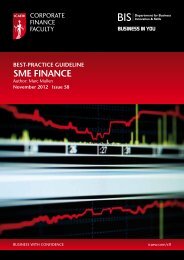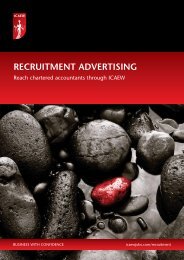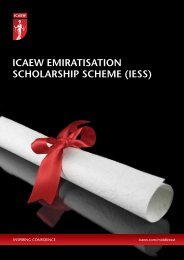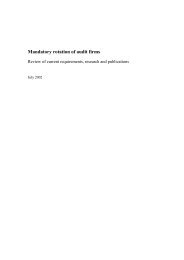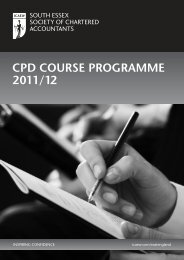<strong>independence</strong> (Dunmore <strong>and</strong> Falk, 2001, p.8). Because independent behaviour (or<strong>independence</strong> in fact) is generally unobservable, the appearance of <strong>independence</strong> assumesprime importance. Empirical evidence also suggests that, rather than being an absoluteconcept, <strong>independence</strong> is a matter of degree (Bartlett, 1993).2.3 Economic models of <strong>audit</strong>or <strong>independence</strong> not including NASDeAngelo’s (1981b) multi-period economic model is perhaps the most widely known.Audit firms obtain revenue directly from the <strong>audit</strong>ee, with directors in many countrieshaving de facto control over the appointment <strong>and</strong> remuneration of the <strong>audit</strong>or. Further,incumbent <strong>audit</strong>ors earn client-specific quasi-rents which, by providing an incentive to‘cheat’ to retain the client company, intuitively lower <strong>audit</strong>or <strong>independence</strong>. Acountervailing force is the existence of similar rents from other <strong>audit</strong>ees, which may be lostif the <strong>audit</strong>or is ‘caught’ (DeAngelo, 1981b). The relative strength of these incentives clearlydepends upon the significance of the <strong>audit</strong>ee to the <strong>audit</strong> firm’s portfolio, the perceivedriskiness of the client <strong>and</strong> the risk of getting ‘caught’. These incentives can operate at firm,office, <strong>and</strong> partner levels.Antle’s (1982; 1984) single-period economic model draws upon mathematical agencytheory. Both client management (principal) <strong>and</strong> the <strong>audit</strong>or (agent) are assumed to be effortaverse <strong>and</strong> utility maximising. Management has incentives to misrepresent the financialcondition of the company <strong>and</strong>, in the absence of some form of restraint, the <strong>audit</strong>or will notexpend effort to identify <strong>and</strong> report this, to the detriment of the owner (Kornish <strong>and</strong> Levine2000, Moizer, 1997, p59)Grout, Jewitt, Pong <strong>and</strong> Whittington (1994) present a model that distinguishes hard fromsoft information available to <strong>audit</strong>ors, both of which are used in the exercise ofprofessional judgment. The exercise of professional judgement enhances theinformational value of <strong>audit</strong>ing to third parties. It is argued that taking measures whichare too firm to ensure absolute <strong>audit</strong>or <strong>independence</strong> may not be in the interests ofinvestors <strong>and</strong> creditors. This is because the <strong>audit</strong>or would tend to carry out ‘defensive<strong>audit</strong>s’ <strong>and</strong> only use hard information that can be used as a defense in litigation(Arruñada, 1999a, p.13), thereby reducing the scope for the exercise of professionaljudgment.2.4 Models of <strong>audit</strong>or pricing <strong>and</strong> <strong>independence</strong> in the presence of NASThere have been few attempts to model this complex situation <strong>and</strong> we have found onlyone published study by Arruñada <strong>and</strong> two unpublished studies.2.4.1 Arruñada’s studyArruñada presents a very comprehensive <strong>and</strong> thorough analysis of the economics of <strong>audit</strong>quality <strong>and</strong> the issue of NAS in a book (1999a), a summary of which is published in anacademic article (1999b). The analysis begins by examining the private (i.e. marketbased)mechanisms used to safeguard quality in <strong>audit</strong>ing. Reputation acts as a qualitysafeguard because it allows higher prices to be charged <strong>and</strong> hence ‘quasi-rents’ to beearned. He identifies three low-cost <strong>and</strong> three high-cost strategies for generatingperformance incentives to the <strong>audit</strong> firm:5
low cost strategies to protect <strong>and</strong>/or enhance reputation• ensure reputational penalties are in line with breaches, i.e. avoid undue loss ofreputation for relatively minor infringements;• the existence of client-specific assets acts as a safeguard for firms with a variedclient base (if <strong>independence</strong> is compromised in respect of one client, the quasirentsassociated with that client are retained, but those relating to all other clientsare endangered);• the provision of <strong>non</strong>-<strong>audit</strong> <strong>services</strong> means that the protection of reputation <strong>and</strong>other safeguards are used more intensively;high-cost strategies to protect <strong>and</strong>/or enhance reputation• advertising <strong>and</strong> other marketing investments that generate ‘br<strong>and</strong> name capital’(though this is banned or restricted in many countries);• raise the barriers to entry (though this involves a serious risk of monopoly <strong>and</strong>regulatory capture); <strong>and</strong>• reinforce regulatory supervision (though costs can be excessive <strong>and</strong> the beneficialeffect on <strong>audit</strong> quality is unproven).<strong>Auditor</strong>s seek to provide NAS because of the considerable economies of scope that ensue,i.e. cost savings that arise when both types of service are provided by the same firm.These economies of scope are of two types: knowledge spillovers that originate in thetransfer of information <strong>and</strong> knowledge; <strong>and</strong> contractual economies that arise frommaking better use of assets <strong>and</strong>/or safeguards already developed when contracting <strong>and</strong>ensuring quality in <strong>audit</strong>ing.Arruñada’s analysis of the consequences of NAS provision focuses on the impact oncosts, quality, competition <strong>and</strong> <strong>independence</strong>. The central debate concerns whether thepositive effect of reduced costs due to economies of scope outweigh the potentialnegative impact on quality, competition <strong>and</strong> <strong>independence</strong>.Addressing quality issues first, NAS provision enhances the <strong>audit</strong>or’s technicalcompetence (by broadening his knowledge of the business) <strong>and</strong> make it possible for <strong>audit</strong>firms to employ specialised experts in a cost-effective manner, thus improving <strong>and</strong>extending their professional judgement.The discussion of competition issues draws upon Arruñada’s careful presentation of theeconomic rationale for introductory pricing <strong>and</strong> inter-temporal competition. It is shownthat st<strong>and</strong>ard industrial organisation analysis shows that cost savings obtained from thejoint provision of both <strong>audit</strong> <strong>and</strong> NAS will be passed on to clients as a price reduction inboth markets <strong>and</strong> at different times (at time of initial or subsequent contracts) dependingupon the competitive circumstances (such as the bargaining power of each party). It isfurther shown that ‘using introductory pricing in <strong>audit</strong>ing or using <strong>audit</strong>ing as a lossleader then appears as the simple spontaneous outcome of inter-temporal competitionwhen there are learning <strong>and</strong> rotation costs’ (1999a, p.169). He goes on: ‘[t]hisintertemporal competitive process is optimal from the public point of view. A better6
- Page 5 and 6: LIST OF TABLESPage3.1 Definitions a
- Page 7 and 8: LIST OF ABBREVIATIONSACCAAICPAAPBAR
- Page 9 and 10: Auditor Independence and Non-audit
- Page 11 and 12: 2.2 Current regulatory frameworks:
- Page 13 and 14: There is limited evidence that, in
- Page 15 and 16: firms have, over the last 10 years,
- Page 17: CHAPTER 2AUDITOR INDEPENDENCE2.1 In
- Page 21 and 22: • the costs of auditor switching
- Page 23 and 24: Johnstone, Sutton and Warfield (200
- Page 25 and 26: estrictive. Nevertheless, these stu
- Page 27 and 28: 3.3 Independence in professional an
- Page 29 and 30: Table 3.1 (cont.): Definitions and
- Page 31 and 32: followed by a detailed set of rules
- Page 33 and 34: Provision of some of these services
- Page 35 and 36: There is a significant self-review
- Page 37 and 38: of taking management decisions, sel
- Page 39 and 40: pieces. While a few research-relate
- Page 41 and 42: CHAPTER 5DESCRIPTIVE STUDIES OF NAT
- Page 43 and 44: Ezzamel, Gwilliam and Holland (2002
- Page 45 and 46: Parkash and Venable’s (1993) stud
- Page 47 and 48: CHAPTER 7IMPACT OF JOINT PROVISION
- Page 49 and 50: affirmative to five type of service
- Page 51 and 52: McKinley, Pany and Reckers (1985) u
- Page 53 and 54: NAS and audit fees regardless of th
- Page 55 and 56: 7.3.5 New Zealand studiesGul (1989)
- Page 57 and 58: support those of Corless and Parker
- Page 59 and 60: CHAPTER 8ASSOCIATIONS BETWEEN JOINT
- Page 61 and 62: an independent variable in the audi
- Page 63 and 64: Ezzamel, Gwilliam and Holland (2002
- Page 65 and 66: 8.7 Auditor tenure and auditor chan
- Page 67 and 68: CHAPTER 9EVIDENCE OF ASSOCIATION BE
- Page 69 and 70:
CHAPTER 10EVIDENCE OF ASSOCIATION B
- Page 71 and 72:
10.3.3 Australian studiesGul and Ts
- Page 73 and 74:
the frameworks are generally imprec
- Page 75 and 76:
publicly available data of relevanc
- Page 77 and 78:
Antle, R. and Demski, J.S. (1991),
- Page 79 and 80:
Craswell, A.T., Stokes, D.J. and La
- Page 81 and 82:
Frankel, R.M., Johnson, M.F. and Ne
- Page 83 and 84:
Jeppesen, K.K. (1998), ‘Reinventi
- Page 85 and 86:
O’Sullivan, N. and Diacon, S.R. (
- Page 87 and 88:
Schuetze, W.P. (1994), ‘A Mountai


